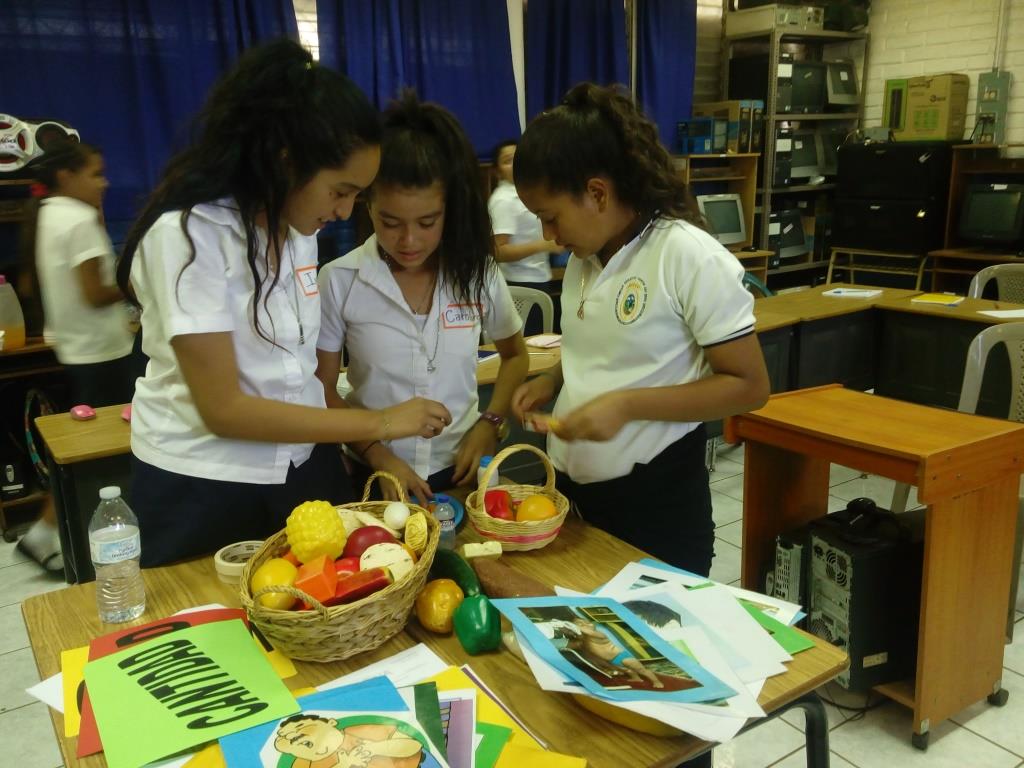Initiative has already benefited more than 23 thousand schools in 13 countries in Latin America and the Caribbean
The Cantón San Isidro educational complex, located in the city of Izalco, El Salvador, significantly improved the diet and eating habits for approximately 1 500 students since 2014. Previously, the children and the young people bought soft drinks, sugary drinks, and many types of sandwiches. The school garden did not receive much attention and the students understood little about the impacts of nutrition on their health. But this is part of the past.
“Our school has changed a lot and, in many ways, because our eating habits have improved with the implementation of Sustainable Schools and a healthy school canteen” says 17-year old student Carolina Vanesa Cárcamo. “We also didn’t pay much attention to the school garden, but now we have vegetables and fruits with which we make many of our meals.”

Carolina Vanesa explains that this change began with the work of FAO and the Government of Brazil in schools, with an emphasis on experiences in food and nutrition education and the implementation of the Sustainable Schools methodology, developed by the Brazil-FAO Cooperation. “This helped a lot because before we did not have a healthy diet, focused on nutrition. We had no knowledge of the effect of food on our body, we did not know that soft drinks and junk food were bad for us and our health, but now we know. ”
Changes
The director of the Cantón San Isidro school, Manuel Guerrero, says that the changes improved the health of the students and the school’s indicators. “There were more attendance of children and young people, greater participation of families and more interest from students, with the organization of family school gardens” he explains. “Our students have changed their attitude towards food. They have learned to distinguish between good and bad nutrition.”
According to Guerrero, the actions motivated them and promoted the economy of the school environment, with purchases of fresh and healthy food from local family farming. “Working in this way allowed us to learn more about the nutritional values of food and, above all, allowed them to choose what kind of food to eat not only at school but at home with their families.”
Sustainable Schools
The Sustainable Schools methodology was developed by the Brazil-FAO Cooperation considering the need to implement sustainable school feeding programs based on elements such as inter-institutional and intersectoral articulation, social participation, professional training, food and nutrition education actions, such as the use of school gardens, the adoption of adequate and healthy menus, the improvement of school infrastructure. Besides that, the establishment of direct purchases from family farmers promotes local development and generates a market for small producers. All this is to scale the school feeding policy at the national level, reaching all schools and all students in the country with this standard of quality and sustainability.
23,000 Sustainable Schools in the region
“With the implementation of the Sustainable Schools methodology, the nutrition and health of children has already improved in more than 23,000 schools in 13 countries of Latin America and the Caribbean, offering better learning conditions, longer permanence in schools and guaranteeing the Human Right to Adequate Food for thousands of students”, highlights Najla Veloso, coordinator of the project Consolidation of School Feeding Programs in Latin America and the Caribbean, executed by the Brazil-FAO Cooperation, through the National Fund for Educational Development (FNDE/MEC) and the Brazilian Cooperation Agency (ABC / MRE).
“Schools are a great environment to collectively overcome poverty, promote quality education, food security and health”, emphasizes Najla.
School feeding laws
Several countries in the region have strengthened their school feeding programs with legal frameworks in recent years. These laws guarantee the continuity and permanence of the programs, with budgets and coverage. In doing so, they contribute to the Human Right to Adequate Food and the promotion of the health of the student population.
In 2021, El Salvador collectively drew up a bill to strengthen its school feeding policy. “The School Feeding Law is much more than delivering food, it is changing education and nutrition forever,” said Diego Recalde, FAO representative in El Salvador. Recalde emphasized that legal frameworks strengthen and make the programs sustainable in the medium and long term, promoting a change in eating habits and improving the health of millions of students, which contributes to the achievement of the SDGs.
“On behalf of all the students of El Salvador, I thank FAO and the Government of Brazil for supporting and transmitting successful experiences from other countries so that we can have a school feeding law that allows long term sustainable financing and a priority on nutrition, which impacts and determines the levels of learning and development “, said the Minister of Education of El Salvador, Carla Hananía de Varela.
Bolivia, Paraguay, Guatemala, Honduras and Ecuador also had the technical and institutional support of the international cooperation carried out by FAO and the Government of Brazil. Mario Domingo Morales, who was director of the Coordination for the Strengthening of the Educational Community in Guatemala, recalls the importance of the legal framework to guarantee the nutrition of 2.5 million students in his country. Morales highlights the increase in investments and incorporation elements of food and nutrition education in schools. “Guatemala learned from the processes and experiences developed in Brazil for more than 60 years. We were one of the recipients of this experience of having a school feeding law. This process, once standardized, is very important to define the attributions of each one within a legal framework”.
This story was originally published in the FAO Country Stories page and it was produced by the team of the project Consolidation of School Feeding Programs in Latin America and the Caribbean







